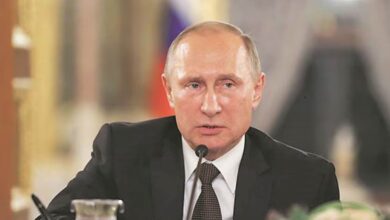2019 Elections: Who Says There is No Alternative?

Possibly, every authoritarian regime propagates a myth that there is no alternative. What prevails, as it is said, is true and absolute; and hence, any critique of the establishment is bound to cause anarchy, normlessness and utter confusion.
In this election year, we too are being repeatedly reminded by the ruling regime that Narendra Modi is the best ‘brand’ possible; and our smartness as consumers of politics in this market-driven age lies in choosing this much-hyped ‘brand’ and feeling ‘secure’.
This argument is dangerous because it robs us of our creative agency and makes us forget that an ‘alternative’, far from being a perfectly hygenic ‘product’ to be offered to us by some external agency, is a process that evolves through our own practices, experiments, contradictions and failures. To deny this praxis is to negate democracy, or the catharsis of politics as a liberating act.
No to narcissism and religious nationalism
To begin with, we need to see the danger in reducing democracy into an act of choosing between two personalities – say, a ‘hyper-masculine’, ‘workholic, ‘make-in India’ famous Narendra Modi and a ‘naive’, ‘inexperienced’, ‘part-time politician’ Rahul Gandhi. And yes, the media houses that love to sell everything, be it culture, news and politics, as a ‘packaged product’ further create a milieu that makes many vulnerable minds feel that nothing is more important than the personality cult.
This emanates from two sources: (a) the colonisation of the lifeworld by the market and (b) the emergent culture of narcissism. It is, therefore, not surprising that the fancy and misdirected MBA graduates are often hired by the political establishment to project a leader as a ‘brand’ filled with all sorts of ‘heroic’ qualities.
And hence, as we have been witnessing since 2014, through the meticulously designed media campaign, and the magic of the camera capturing every act of his ‘dramaturgical performance’, Modi is projected as the best prime minister India has ever seen: a ‘refreshing departure’ from ‘westernised’, ‘immoral’ Nehru, ‘dynastic’ Indira Gandhi and ‘accidental’ Prime Minister Manmohan Singh.
Narendra Modi and Rahul Gandhi. Credit: Reuters
Furthermore, the culture of narcissism – a product of social Darwinism or the doctrine of the ‘survival of the fittest’ – seeks to hypnotise us. When most of us feel powerless and alienated in the age of anonymity, the mythical tales of an ‘achievement-oriented’, ‘hyper- masculine nationalist’ attract us with the grand promise of ‘saving’ us from the ‘enemies: ‘Pakistan- sponsored’ terrorists in Kashmir,’ illegal migrants’ in Assam, and ‘non-patriotic’ Muslims in Uttar Pradesh refusing to see the sacredness of the ‘holy cow’.
It is not fundamentally different from the way the ‘angry’ Vijay (Amitabh Bachchan) in the Bollywood blockbuster Deewaar used to charm the youngsters in Mumbai’s Dharavi slum. Packaged politics is always for mass consumption.
And this is precisely the reason why we need to work on an alternative. We ought to say no to the politics of personality cult – the media-driven, market-induced urge to sell it as a consumable good and we ought to see politics as a critical and creative engagement with the discourse of power: the way we revisit the policies relating to social security, economic decentralisation, land reform, distributive justice and psycho-cultural movement for resisting patriarchal, casteist hierarchies. This requires our participation and our voices.
We are creators, not consumers. Well, leaders are not unimportant. However, we do not need narcissistic leaders with inflated egos. We do not need any ‘magician’ or any authoritarian personality. We need dialogic/humble leaders – almost like Antonio Gramsci’s ‘organic intellectuals’ –in constant communion with people. Well, it is possible for a leader to have what sociologist Max Weber would have regarded as ‘charisma’; but then, let the charisma, as Mohandas Karamchand Gandhi revealed, evolve throgh organic connectedness with people rather than the hyper-reality of media simulations.
Likewise, there is yet another danger in the discourse of nationalism that the ruling regime sanctifies. For the ruling establishment, any dissent is potentially ‘anti-national’; it is like monoploising the virtues of ‘patriotism’. Yes, with a sense of history and a deep understanding of the flow of an old civilisation like ours, we ought to find an alternative and say no to the discourse of Hindutva or religious nationalism. Believe it, the kind of nationalism Modi’s ‘brand’ represents is intellectually dull, culturally poor and spiritually impoverisehed.
It cannot understand why with a frail body Gandhi walked through the lanes of Noakhali; it has no sensitivity to understand what the gifted Urdu writer Saadat Hasan Manto captured at the moment of partition turmoil: Toba Tek Singh’s ‘madness’ reveaing the futility of an artificial line of division. And it cannot understand why in one of his finest poems, Tagore saw India as an ocean: a confluence of multiple religions, ethnicities and races.
We do not need the fetish of nationalism. Nor do we require its loud symbolism. We need a nation that –like Anandamayee in Tagore’s novel Gora – embraces all with maternal care. Inclusion, not exclusion; dialogue, not monologue; pluralism, not homogenisation; people’s power, not the spectacle of the militaristic aggression: let it be the new language of alternative nationalism.
Alternatives are never perfect
No, these alternatives cannot emerge suddenly. With experiments, contradictions and even failures we move; and the very willingness to undertake this challenge is a new beginning. Is it possible for the ‘opposition’ parties to move towards these alternatives?
Yes, we ought to raise these questions for two reasons. First, the prevalent electoral practice, because of the might of money, muscle power, prevents many honest persons from participating in the system. No wonder, we often see the MLAs (irrespective of the parties they belong to) in a hung assembly being taken to the well-protected resorts so that they cannot be bought and sold. This is really ironic – an insult to people’s choices.
Second, the instrumental, strategic urge to win the election at any cost leads to all sorts of ‘compromises’. The candidates they choose – say, a real estate mafia, a local goon, or a powerful minister’s daughter-in-law –need not necessarily be the ones we are fond of.
In fact, we lose control over the political parties; and ironically, the act of voting is reduced into an exercise in opting for the ‘lesser evil’. The fundamental issues are, therefore, forgotten; and we remain preoccupied with all sorts of juicy riddles suitable for toxic editorials in sensational newspapers: Is hyper-ambitious Mayawati’s ‘masterstroke’ better than Yogi Adityanath’s communal politics? Is Mamata Banerjee’s aggression an appropriate response to Amit Shah’s cleverness? Or, for that matter, is Rahul Gandhi’s ‘hug’ a reminder of the limits to the ‘signs’ Modi’s armoured body can emit?
Former Uttar Pradesh CM Akhilesh Yadav with BSP chief Mayawati. Credit: PTI
Yet, given this inherent limitation of the party-centric parliamentary democracy, we would take part in the coming general elections. And we must strive for an alternative even if it is not perfect, because if we continue to accept the way things prevail now: the ethos of a civilisation known for its splendid diversity is likely to be destroyed further and amid the dramatic rise of the Ambanis and the Adanis, the people of this bounded geographical territory called India – artisans and farmers, workers and struggling masses, and Dalits and tribals – will continue to experience the horror of economic insecurity, joblessness and cultural marginalisation.
However, the search for radical alternatives does not end with the elections. It is a continual process.
Can it be our pledge on the Republic Day?
Avijit Pathak is a professor of sociology at JNU.







